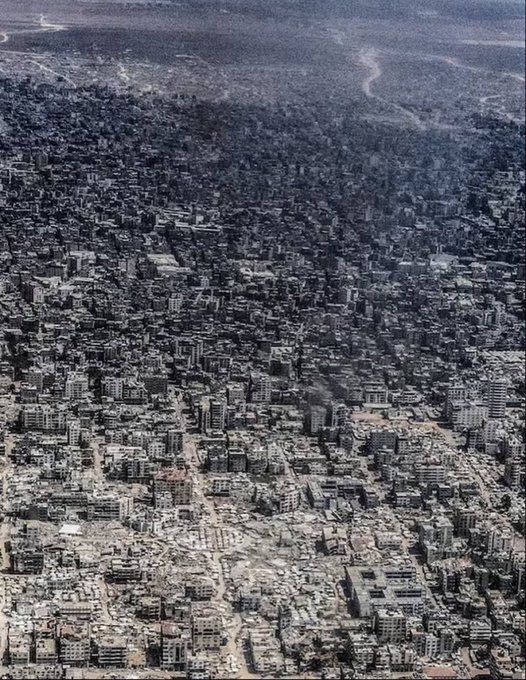Summer holidays have ended and children will be going back to school this month.
IHRC Bookshop advocates the importance of educating ourselves regardless of age, gender and background.
The Prophet Muhammad (peace be upon him) stated that: “seeking knowledge is an obligation for every Muslim.”
Malcolm X stated that: “Education is the passport to the future, for tomorrow belongs to those who prepare for it today.”
We can see in our society and beyond how mainstream media and politicians help foster an environment of hate and fear at a time when multiple genocides are occurring across the world. The responsibility is upon every single one of us to educate ourselves and others and also pass on our knowledge to future generations.
We also have a few announcements for you.
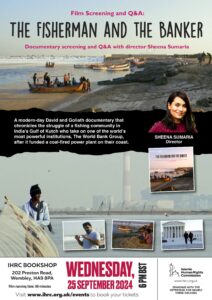 Film Screening and Q&A: The Fisherman and the Banker
Film Screening and Q&A: The Fisherman and the Banker
Join us for an exclusive film screening for the documentary, The Fisherman and the Banker, and a Q&A with director, Sheena Sumaria. Watch the trailer here.
BOOK TICKETS
WHEN: Wednesday, 25 September, 2024, 6pm BST
WHERE: IHRC Bookshop (202 Preston Road, London, HA9 8PA)
BOOK: purchase tickets here
Film running time: 90 minutes.
Refreshments provided.
Prayer and wudu facilities available.
About the documentary:
Filmed over a decade, “the Fisherman and the Banker” is modern-day David and Goliath documentary that chronicles the struggle of a fishing community in India’s Gulf of Kutch who take on one of the world’s most powerful institutions, The World Bank Group, after it funded a coal-fired power plant on their coast.
In Gujarat, the fishermen and their movement, MASS, have long been fighting against power plants that threaten their way of life. Then in 2015, they join forces with EarthRights International, a Washington DC-based NGO, and file a lawsuit against the World Bank’s private lending arm, the International Finance Corporation (IFC), after it provided a critical loan to the Tata Mundra power plant, despite recognising it as high risk project. As the legal challenge progresses to the US Supreme Court in 2018, the film documents the community’s pursuit of justice.
Through a poetic and observational lens, the film captures not just the legal battle but the profound connection between the community and their environment. Will these indomitable fishermen succeed in rewriting international law to protect their heritage and environment, or will the might of the IFC prevail?
About the director:
Sheena Sumaria, a British-Gujarati documentary filmmaker, transitioned from a career in international development to filmmaking. With degrees in Economics and Development Studies from Cambridge and SOAS, her passion for social justice drives her work. She began with “Still Standing,” highlighting life in Medellin’s slums, followed by films on the Chilean student uprising and the 2002 Gujarat pogrom. Her short films address various social issues, including Brexit and homelessness. Her latest documentary, “The Fisherman and the Banker,” is a fourteen-year, mostly self-funded project that explores a fishing community’s battle against the World Bank in India’s Gulf of Kutch. Her multicultural background inspires her to tell transnational stories connecting local struggles to global issues.
 Author Evening with Muadh Chati: An Introduction to the Science of the Noble Hadith
Author Evening with Muadh Chati: An Introduction to the Science of the Noble Hadith
Join us for an online author evening with Muadh Chati to discuss the compilation, An Introduction to the Science of the Noble Hadith VOL 1.
This discussion will be chaired by Talha Ahsan.
WHEN: Friday, 13 September, 2024, 6.30pm BST
WHERE: YouTube, Facebook, and IHRC.TV
Tickets/booking are not required.
About the book:
This book begins with an introduction to the codification of hadith, then an appreciation of the critical methodology of the muhaddithun, then a discussion on the common narrators of hadith, and then the entire process of takhrij is explained with a detailed introduction on many different books of hadith. The book contains the biographies of over 25 important scholars of hadith (including Ibn Hajar, Al-Iraqi, Al-Dhahabi, Al-Mizzi, Ibn Kathir, Ibn Sa’d, Al-Suyuti, Al-Bayhaqi, Ibn ‘Abd al-Barr, Al-Khatib, Abu Ya’la, Ibn Khuzaymah, Imam Ahmad, Al-Tabarani, Al-Bazzar, Mughlatay, Al-Hakim, Al-Zayla’i, Ibn al-Athir, Muhammad Ibn Sa’d, Al-Haythami, Ibn Abi Shaybah, Al-Harith Ibn Abi Usamah, Musaddad Ibn Musarhad, Al-Daruqutni).
The book is filled with charts, diagrams and pictures of books to give a visual of every book. Not only this, but sample pages of important books are also shown. The important books are also supplemented with a QR code that takes you to the pdfs of these books.
Unlike usual English books, this book maintains the Arabic quotes to give the statements of the scholars an authentic feel with everything referenced. The death dates of scholars are also maintained to allow students to remember their death dates. For those who would like a guide to the book with the author teaching the entire book, the book contains a QR code at the start that will allow you to access this tremendous course which has over 30 hours of content.
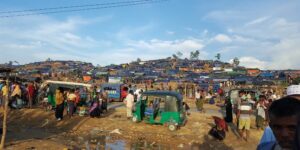 Donate and Support the Rohingya
Donate and Support the Rohingya
The Rohingya have faced decades of discrimination, violence, and repression under successive Myanmar governments. Over 1 million Rohingya are currently living in overcrowded camps in Bangladesh, most of whom fled Myanmar since August 2017 to escape the military’s crimes against humanity and possible genocide. They were subjected to untold levels of brutality including mass killing and rape.
Our partners are on the ground and respond to the emerging needs, which includes emergency shelter, food, and educational support.
Our funds supports the education and training of the Rohingya, such as computer coding programme courses, allowing them to be educated and trained to be self-sufficient. Equipping them with valuable skills that can serve as a catalyst for rebuilding their lives. Education not only opens doors to employment opportunities but also fosters a sense of purpose and empowerment.
The Rohingya have seen increased hostility in places where they have taken refuge, subjected to abuse, sexual exploitation, kidnapping and slave labour. Our projects have been a safe haven for the most vulnerable amongst the Rohingya, especially women and children. This comes at a time where the Rohingya in places like Indonesia and India have been subjected to ridicule and abuse by locals. With your support we can provide ongoing support, such as education, food and shelter.
The Rohingya desperately need your support. IHRC Trust is raising funds to help deliver critical aid to Rohingya refugees who have fled to Bangladesh and Malaysia. Click below to donate.
Throwback Webinar: Children’s Rights to Express Solidarity with Palestine
Children have been targeted in schools for expressing solidarity with the people of Palestine. A number of school teachers as well as some headteachers have threatened to discipline children if they continue to express that solidarity in any way. This webinar streamed on 27 May 2021 explored some of the issues raised and to empower the children and the parents involved by looking at the issues from different angles including legal, human rights academic as well as educational perspectives. To watch the webinar, click below.
Haim Brasheeth-Zabner (Academic) is a filmmaker, photographer and a film studies scholar, retired from the University of East London, where he worked since since early 2002. He now teaches at the School of Oriental and African Studies (SOAS). Mudassar Arani is a solicitor of Arani Solicitors who deal with Criminal Defence, Family and Human Rights cases.
Below are books that are currently in stock. For more books, visit our website.
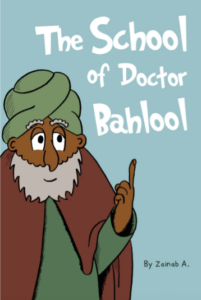 The School of Doctor Bahlool – Zainab A.
The School of Doctor Bahlool – Zainab A.
Bahlool lived at the time of Imam Ja’far as Sadiq (as) and Imam Musa al-Kadhim (as). The fear of persecution at the hands of the Abbasid Caliphs forced the followers of the Ahlulbayt to look to creative ways to preserve their lives while continuing to support the mission of Islam and maintaining it’s true sanctity. Bahlool adopted the life of insanity to save his life and serve Islam at the advice of the Imam. All the while imparting valuable lessons to those around him as well as the Caliph himself!
This book attempts to bring some of those stories to life in a way that children can relate to. It was inspired by a little child’s love for poetry and the need to offer the children in our community a fun book of rhymes that imparts valuable gems found within our faith.
Zainab is a homeschooling mother of two with a passion for a holistic approach to education. Her work is inspired by her own children as well as the children she has worked with in different capacities at the local Islamic Schools and centers.
In 2014 the ‘Trojan Horse’ affair, an alleged plot to ‘Islamify’ several state schools in Birmingham, caused a previously highly successful school to be vilified. Holmwood and O’Toole challenge the accepted narrative and show how it was used to justify an intrusive counter extremism agenda.
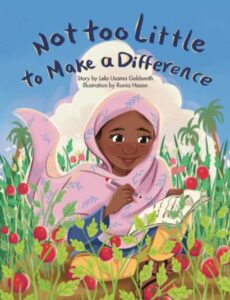 Not Too Little To Make a Difference – Lela Usama Goldsmith
Not Too Little To Make a Difference – Lela Usama Goldsmith
Sofia is eager to start the new school year because she will finally be able to enter the Junior Journalist competition. Just as she finishes writing her story entry, Sofia’s mother breaks the news that without school tuition, she cannot go back to school yet. Will Sofia ever be able to enter the competition and realise her dreams of becoming a journalist?
A story of perseverance, heart and believing that god will never allow good work to go to waste. Illustrated by Rania Hasan.
This book, originally presented as a paper to the Second World Conference on Muslim Education in 1980, for the first time in contemporary Islamic thinking and in a clear and coherent manner, elaborates new and originally conceived ideas and definitions. Key concepts such as religion (din), man (insan), knowledge (ma’rifah and `ilm), wisdom (hikmah), justice (`adl), right action (`amal and adab) are discussed, elaborated and formulated into a framework for an Islamic philosophy of education.
The concept of methodology of scientific research and the study of nature along the lines of Quranic interpretation (tafsir and ta’wil), the islamization of languages and its relation to the Muslim mind and worldview, and the differences between tarbiyyah, ta’dib and ta’lim are all discussed. This is a book of definitions relating to the essential elements in the concept of education and the educational process as envisaged in Islam. Essential reading for Muslim educators and all those interested in Islamic philosophy and islamization of knowledge.
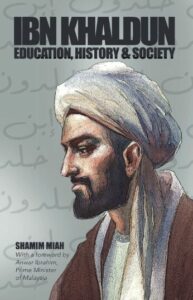 Ibn Khaldun: Education, History and Society – Shamim Miah
Ibn Khaldun: Education, History and Society – Shamim Miah
Ibn Khaldun (1332-1406) is a significant intellectual figure within the Muslim world. He is seen as the founding father of sociology, whilst making significant contributions in the fields of history, economics and philosophy.
Despite the growth in the study of Ibn Khaldun in the west, his contributions to the field of social sciences is often limited to the academic community.
This book aims to bring the works of Ibn Khaldun to a much broader audience by drawing upon Ibn Khaldun’s Muqaddimah to provide insights into his ideas on education, sociology and history.
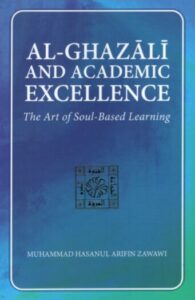 Al-Ghazali and Academic Excellence: The Art of Soul-Based Learning – Muhammad Hasanul Arifin Zawawi
Al-Ghazali and Academic Excellence: The Art of Soul-Based Learning – Muhammad Hasanul Arifin Zawawi
In an era of materialism-based, ranking centered, and anxiety-inducing academic excellence, the wisdom of al- Ghazālī (1058-1111 A.D) and his powerful ideas on holistic education have become increasingly relevant. In response to the contemporary challenge above, this book aims to describe, clarify and conceptualize al-Ghazali’s adab-centric concept and method of academic excellence embedded in his corpus of educational writings and profound discourses on epistemology and psychology.
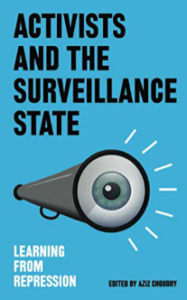 Activists and the Surveillance State: Learning from Repression – Aziz Choudry
Activists and the Surveillance State: Learning from Repression – Aziz Choudry
The use of secret police, security agencies and informers to spy on, disrupt and undermine opposition to the dominant political and economic order has a long history. This book reflects on the surveillance, harassment and infiltration that pervades the lives of activists, organisations and movements that are labelled as ‘threats to national security’.

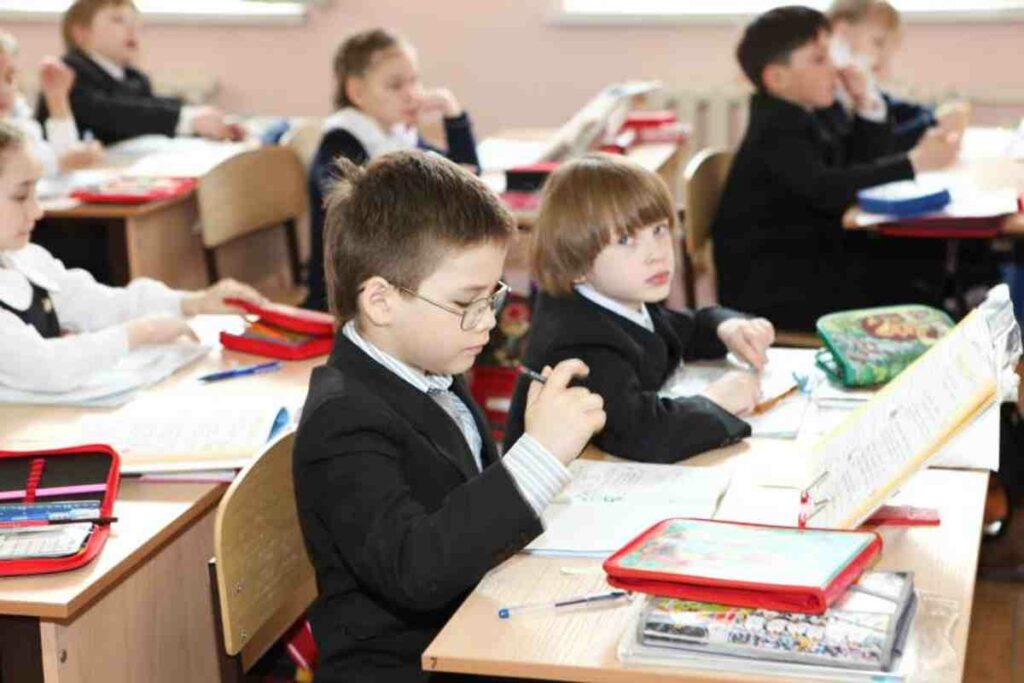
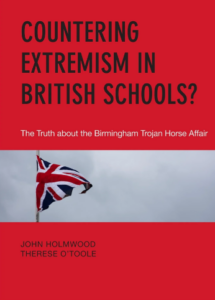 Countering Extremism in British Schools? The Truth About the Birmingham Trojan Horse Affair – John Holmwood & Therese O’Toole
Countering Extremism in British Schools? The Truth About the Birmingham Trojan Horse Affair – John Holmwood & Therese O’Toole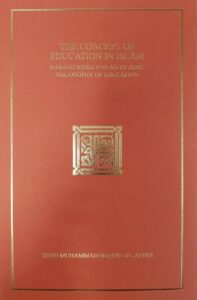 The Concept of Education in Islam: A Framework for an Islamic Philosophy of Education – Muhammad Naquib Syed Al-Attas
The Concept of Education in Islam: A Framework for an Islamic Philosophy of Education – Muhammad Naquib Syed Al-Attas